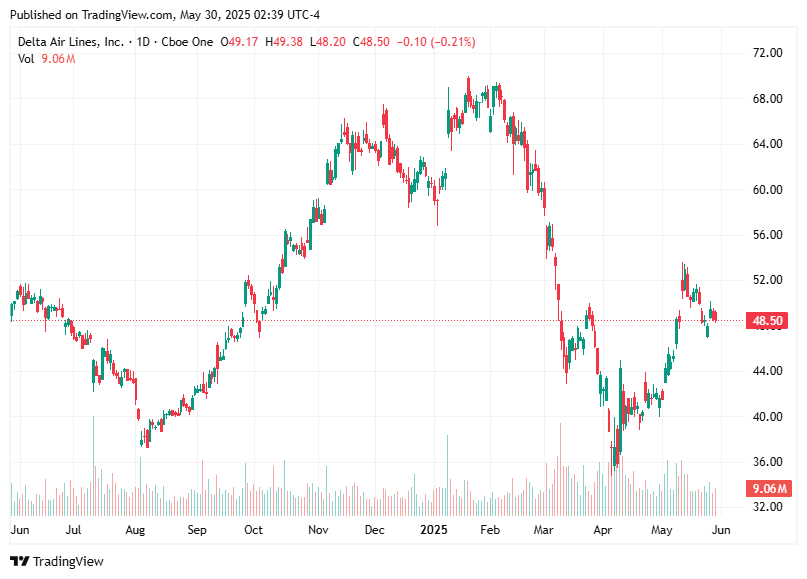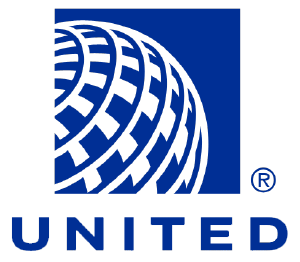Delta vs United: one stock’s soaring, one’s just taxiing — which should you buy? (If any)
I compare their routes, revenue, and runway to see which airline deserves a place in your portfolio.
This week, we’re navigating the skies of the U.S. airline industry to compare two aviation titans: Delta Air Lines and United Airlines. Both carriers are pivotal in connecting travelers across the globe, yet they differ in operational strategies, financial health, and market positioning. Let’s take off.
Industry Overview
The airline industry in 2025 is contending with several significant factors:
Economic Uncertainty: Global trade tensions and fluctuating demand have led to cautious consumer spending and corporate travel budgets.
Operational Adjustments: Airlines are reevaluating capacity and route networks to align with shifting demand patterns.
Technological Advancements: Investments in fleet modernization and digital customer experiences are becoming increasingly important.
Environmental Considerations: Sustainability initiatives are influencing fleet choices and operational practices.
So, how do Delta Air Lines and United Airlines fare amidst these dynamics?
Delta Air Lines, Inc. (NYSE: DAL)
Founded in 1925 and headquartered in Atlanta, Georgia, Delta Air Lines is one of the oldest and most respected carriers in the world. With a global network that spans over 275 destinations across six continents, Delta has consistently focused on premium service, operational reliability, and long-term brand equity. The airline is known for maintaining one of the most loyal customer bases in the industry, thanks in part to its award-winning SkyMiles loyalty program, robust network of airport lounges, and consistent investment in customer experience.
Delta operates a hub-and-spoke model with major hubs in Atlanta, Minneapolis, Detroit, Salt Lake City, New York (JFK and LaGuardia), and others. It also holds strategic partnerships and joint ventures with major global airlines such as Air France-KLM, Virgin Atlantic, and LATAM, expanding its international footprint and boosting revenue diversification.
Financially, Delta is seen as one of the more disciplined carriers. It has consistently invested in fuel-efficient aircraft and digital enhancements, and has remained focused on maintaining a strong balance sheet. As of Q1 2025, Delta's performance reflects resilience in a high-cost environment, balancing fuel expenses, wage growth, and inflationary pressures while continuing to return capital to shareholders through buybacks and dividends.
Recent stock performance: As of May 29, 2025, Delta Air Lines' stock is trading at $48.60, reflecting a 0.79% decrease from the previous close. The stock has experienced a 19.21% decline year-to-date, with its 52-week high at $69.98 and a low of $37.29. Despite facing challenges, including a significant IT outage in July 2024 that led to over 7,000 flight cancellations and reputational damage, Delta reported a record pre-tax profit of $1.6 billion in Q4 2024. The company continues to invest in technology and customer experience enhancements, aiming to bolster its operational resilience and financial performance.
3 reasons to consider Delta Air Lines:
Strong Financial Position: Delta reported Q1 2025 operating revenue of $14.0 billion and operating income of $569 million, demonstrating resilience in a challenging environment.
Operational Efficiency: The airline maintains a focus on cost control and operational excellence, contributing to its ability to navigate economic fluctuations.
Customer Loyalty Programs: Delta's SkyMiles program and partnerships enhance customer retention and ancillary revenue streams.
United Airlines Holdings, Inc. (NASDAQ: UAL)
United Airlines, founded in 1926 and based in Chicago, Illinois, is a key player in global aviation and one of the largest U.S. carriers by revenue and international reach. Operating over 4,500 flights per day to more than 300 destinations across five continents, United boasts an unmatched presence in major business travel corridors, including key transatlantic and transpacific routes. Its hub cities include Chicago (ORD), Newark, Denver, Houston, Washington D.C., Los Angeles, and San Francisco, giving it robust connectivity across North America and beyond.
What sets United apart is its strategic focus on global growth and premium cabin services. The airline has heavily invested in its Polaris business class product, airport lounges, and a refreshed long-haul fleet, aiming to attract higher-yielding business travelers. United has also placed one of the largest orders in industry history for next-generation aircraft, signaling confidence in future demand.
Financially, United’s Q1 2025 marked a turning point, posting record revenue and swinging to profitability despite macroeconomic headwinds. The airline is now leaning into fleet modernization, network optimization (scaling back less profitable off-peak flights), and expanding its cargo and loyalty programs. United's leadership has clearly signaled its intent to prioritize margin growth and shareholder returns over brute expansion alone.
Recent stock performance: As of May 29, 2025, United Airlines' stock is priced at $77.50, down 0.70% from the previous close. The stock has shown strong performance, with a 52-week high of $116.00 and a low of $37.02. United has outperformed many peers, including several of the "Magnificent Seven" tech stocks, attributed to its robust international operations and fleet modernization efforts. In Q3 2024, the airline announced a $1.5 billion share buyback program and reported higher-than-expected earnings, signaling confidence in sustained growth and shareholder value
3 reasons to consider United Airlines:
Record Revenue: United reported Q1 2025 revenue of $13.2 billion, marking a 5% increase from the previous year and setting a company record for the first quarter.
Profitability Milestone: The airline achieved adjusted net income of $302 million in Q1 2025, a significant turnaround from a loss in the same period the previous year.
Strategic Network Adjustments: United plans to optimize its flight schedule by reducing off-peak operations and retiring older aircraft, aiming to enhance efficiency and profitability.
So… which airline stock would YOU invest in?
Would you choose Delta Air Lines, with its emphasis on operational excellence and customer loyalty?
Or do you prefer United Airlines, with its recent profitability milestones and strategic network optimization?
Let me know in the comments. I want to hear how you think through this choice.
SPOILER ALERT:
Here’s my personal take on the two stocks:
While both airlines have demonstrated resilience, United Airlines (UAL) currently presents a more compelling investment opportunity. Its record revenue and return to profitability in Q1 2025 indicate strong operational performance and effective strategic adjustments. United's focus on optimizing its network and fleet positions it well to navigate ongoing industry challenges.
Delta Air Lines (DAL), with its strong financial foundation and customer loyalty initiatives, remains a solid player in the industry. However, the recent economic uncertainties and operational challenges may impact its short-term performance.
Therefore, based on the current financial data and market trends, United Airlines (UAL) appears to be the better stock to own right now. But that’s just my opinion; this is not financial advice and this content is for educational purposes only.
EVERY FIRDAY: STOCK COMPARISON CHART
I post a new side-by-side stock breakdown every Friday. If you want to stay on top of my insights and get more valuable information with each post, make sure to subscribe.
And if you liked this one, please share it with a friend who’s into markets, investing, or in this case: aviation.
HERE ARE THE 1-YEAR DAILY CHARTS:
DELTA AIR LINES, INC. (NYSE: DAL)

UNITED AIRLINES HOLDINGS, INC. (NASDAQ: UAL)

If you were only to invest in one of the two, which one would you pick? Let me know your choice in the comments and tell me why you would choose one over the other.
And if you want more, I suggest you check out last week’s Friday Stock Comparison between Airbnb and Booking Holdings — just a click away.
Airbnb vs Booking: I ran the numbers and the winner surprised me - Airbnb (ABNB) vs Booking Holdings (BKNG)
This week, we’re diving into the online travel sector to compare two of the most influential players in the industry: Airbnb and Booking Holdings. While both companies serve travelers and vacationers worldwide, they operate on different business models and target different segments of the market. Let’s explore.
Dennis Riosa
Make | Things | Happen








This was nice to read! Maybe next time you could compare some European companies? Or oil companies. It would be nice to know more about environmental or health tech as well!